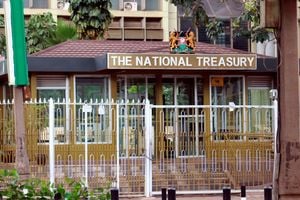
The new regulations will enforce penalties, including dismissal and demotion, for non-compliance, requiring a more balanced representation of all ethnic groups.
Principal secretaries and chief executives of state parastatals could soon risk dismissal or demotion for hiring people from Kenya's four dominant tribes, as part of a legal push to achieve ethnic balance in the civil service.
The Public Service Commission (Affirmative Action) Regulations 2024 propose sanctions against the Public Service Commission (PSC) and other top state officials in charge of human resources - Principal Secretaries and Chief Executives - for ignoring plans to correct tribal imbalances in the distribution of public sector jobs.
The four communities - Kalenjin, Kikuyu, Kisii and Luo - are considered over-represented because their share of jobs in the civil service exceeds their share of the national population.
The rules require recruitment officials to balance the proportion of public jobs in favour of smaller tribes.
This means that fair competition and merit are overlooked in the quest to ensure that taxpayer-funded offices have a face of Kenya where all communities are given a chance to serve.
“Any person who contravenes any provision of these regulations shall be subjected to disciplinary proceedings in accordance with the terms of service and liable to penalties specified in Section 68 of the Public Service Commission Act or any other written law,” says the draft regulations.
The PSC Act prescribes penalties which may be imposed on a public officer following disciplinary proceedings including reprimand, deferment of increment in salary and the deferment of a promotion.
The Act also recommends deeper sanctions such as dismissal and demotion.
Principal Secretaries play the delegated function of overseeing human resources within ministries on behalf of the PSC while parastatal chiefs have overall human resources responsibilities including appointments, welfare, training and industrial relations.
The PS and the chief executives of state corporations are expected to work with the PSC in correcting the ethnic imbalance in the civil service and parastatals.
“The Commission and all public bodies shall develop and implement affirmative action plans that specify the policies and practices to be instituted by the public body in the medium term including medium-term numerical goals, for the hiring, training, promotion and retention of persons from special interest groups to correct the under-representation identified by the analysis,” the regulations say.
Ethnic composition of appointments in the civil service have come under scrutiny.
Multiple reports show that Kikuyu and Kalenjin communities dominated top jobs in government, embassies and chief executive positions in parastatals.
The PSC said in their report that Kikuyus and Kalenjins account for 20.53 percent and 17.3 percent of the 253, 318 jobs in the national government.
The two tribes are top on overrepresentation when their share of the population is factored. PSC report say Kikuyus and Kalenjins are overrepresented by 3.39 percent and 4 percent respectively, followed by Kisii (1.63 percent) and Luo (1.03 percent).
The Constitution introduced the ethnic representation requirements to check a historical trend where tribesmen of those in power were favoured during recruitment.
Ethnic groups whose job representation surpasses their corresponding national population proportion are considered to be over-represented.
The Kikuyu and Kalenjin dominance mirrors the two tribes’ presence at the highest office in Kenya since Independence.
Mr Kenyatta succeeded Mr Kibaki, both Kikuyus. President Daniel arap Moi who ruled for 24 years before Mr Kibaki was a Kalenjin. President Ruto, also a Kalenjin, rose to the helm of the top after serving as Kenyatta’s deputy for a decade.
On the flipside, the Kenyan Somali, Luhya, Maasai, Mijikenda and the Turkana are underrepresented while the Dahalo and Kenyan Americans are not represented in public service.
Kenyan Somalis suffer the worst under representation rate at 3.01 percent with only 7,195 roles in the service or a 2.84 percent share against a population of 2.78 million.
Other top underrepresented tribes are Luhya (2.54 percent), Mijikenda (1.9 percent and the Turkana (1.34 percent) and Maasai (0.64 percent who look set to benefit from fresh appointments and promotions if lawmakers back the new regulations.
Some State corporations such as the Kenya Revenue Authority (KRA) have moved ahead of the new affirmative action regulations to push for equity in hiring.
The taxman plans a new hiring policy to boost diversity and inclusivity after the High Court nullified the recruitment of 1,406 revenue assistants in March this year for lack of ethnic balance.
The hiring of the assistants was found to be skewed in favour of the Kikuyu and Kalenjin.
The new KRA hiring policy seeks a balanced ethnic representation, ensuring no gender accounts for more than two-thirds of jobs and tapping the youth and persons with disabilities for fresh hires.







